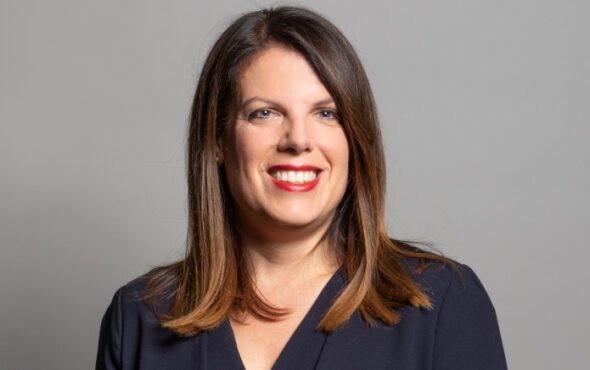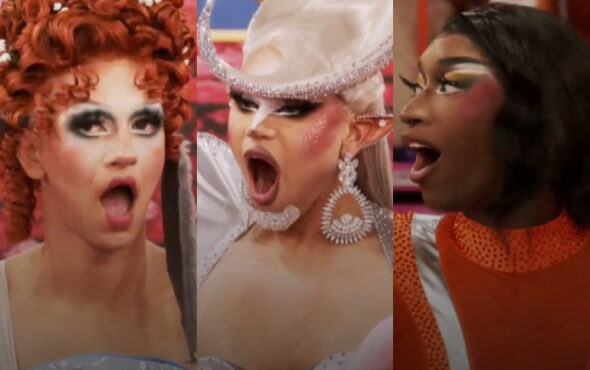
Caroline Nokes, the Conservative MP who chairs the Women and Equalities Committee, has spoken out against Rishi Sunak and Suella Braverman for their “unacceptable” anti-trans comments.
Earlier this month, Braverman, the Home Secretary, joked that “we can’t rule out” Keir Starmer “running to be Labour’s first female Prime Minister” at the next election.
Meanwhile, in a recording leaked to PinkNews, Sunak, the Prime Minister, told a group of Conservative MPs that the Liberal Democrats were “busy trying to convince everybody that women clearly have penises”.
Speaking on the ‘What the Trans?’ podcast, Nokes condemned the comments made by her peers in the Conservative Party.
READ MORE: ‘Conversion therapy’ ban: Caroline Nokes MP speaks out against ‘consent clause’
“I think it’s hugely othering, it’s very dangerous, and it’s seeking to make a group of people the butt of jokes,” she said. “I just think it’s unacceptable.”
“We should be setting ourselves higher standards”
Nokes said Braverman’s remark was “a ridiculous comment” and added: “I thought it was very telling that there was silence in the House, there was tumbleweed rolling down the aisles…let’s not use the House of Commons chamber to poke fun at marginalised groups or some sort of school debating society, we should be setting ourselves higher standards.”
Discussing Sunak’s comments, she said: “I just think we need to be better than that, we really do.”
READ MORE: Activists condemn Rishi Sunak for mocking trans people in leaked video
Anti-trans rhetoric is on the rise in the Conservative Party, with its chair, Lee Anderson, in February claiming that the next general election should be fought on a “mix of culture wars and trans debate”.
Nokes acknowledged that her viewpoint “may be failing within my own party at the moment” though did emphasise that there are Tory MPs who support the trans+ community.
“I get reports from EHRC staff anonymously that it is not a happy ship”
In addition to this, she expressed “grave concerns” over the Equality and Human Rights Commission (EHRC), which has faced ongoing claims of a toxic culture.
“I get reports from EHRC staff anonymously that it is not a happy ship,” she told the podcast, adding that there has been a “very particular director of travel when it comes to gender critical views” there since the appointment of Baroness Falkner as its chair by Liz Truss in 2020.
“I look at the appointment now through the prism of, this was an appointment done by Liz Truss, who had a very particular agenda when it came to equalities,” Nokes continued.
READ MORE: Sadiq Khan: “The trans community should not be stigmatised, demonised or weaponised”
The EHRC faced extensive criticism earlier this year when it published a letter to Kemi Badenoch, Equalities Minister, with the suggestion of a possible amendment to the Equality Act to define “sex” as “biological sex”.
“I think this is the government opening a can of worms out for itself that to be quite frank, I don’t think needs opening,” Nokes said of the matter. “I fail to understand why it should be a priority for anyone at the moment, unless you’re just looking for a wedge issue. We have a general election coming in the next 18 months…and I do not understand why anybody would think that this was a good issue to make front and centre in any general election campaign.”
Discussing attempts to exclude trans people from accessing the single-sex spaces they require, she added: “This is a classic bully tactic, we’re going to go after the small group who too few people care about, and we’re going to other them, and we’re going to make it all but impossible for them to access services the rest of us take for granted.”
READ MORE: EHRC condemned for “harmful” guidance saying trans people can be excluded from single-sex services
In a statement issued to iNews, a spokesperson for the EHRC said: “In April we advised the Minister for Women and Equalities that clarifying the definition of sex in the Equality Act 2010 merits further consideration. We suggested that the UK Government carefully identify and consider the potential implications of this change, if it is taken forward.
“There is a clear need to move the public debate on issues of sex and gender to a more informed and constructive basis. We look forward to working with the Government and others to find a way forward on these important issues, but recognise that these decisions sit with the UK Government and UK Parliament.”



